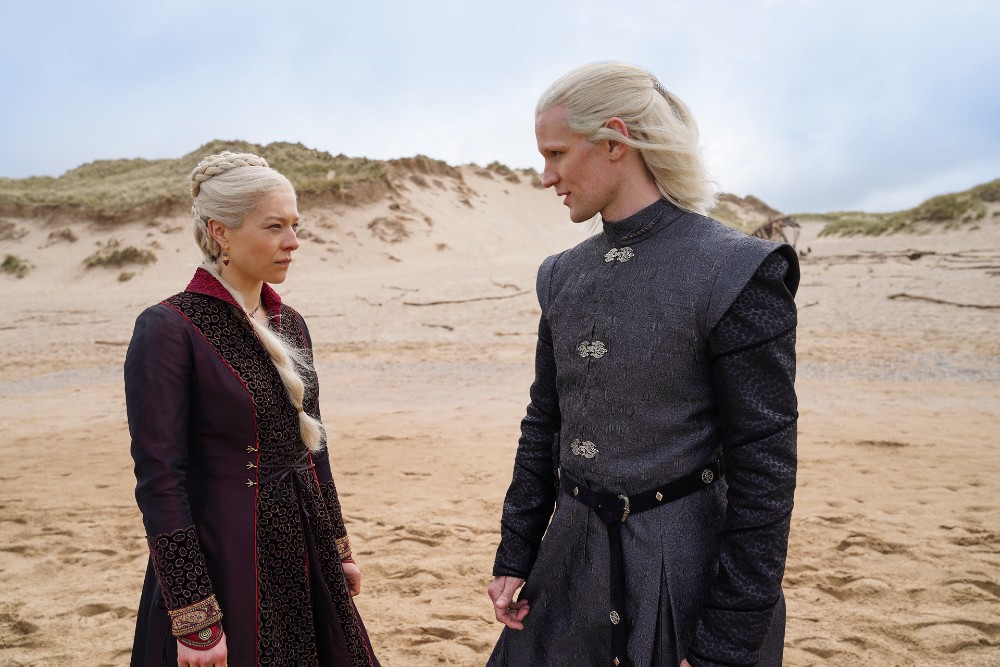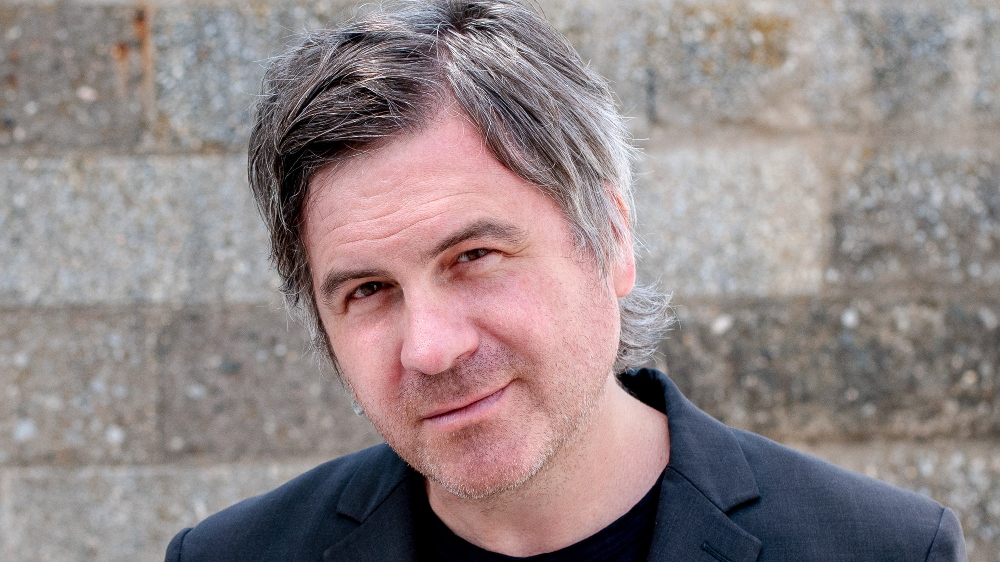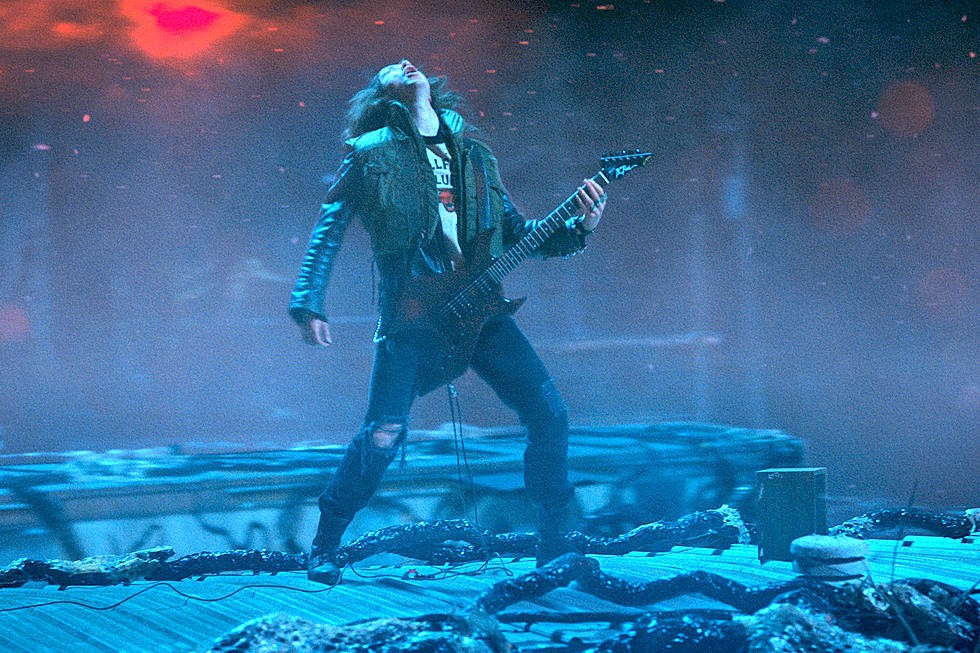
When Emmy nominations were announced on July 12th, it was a great day for eight-time winner David Klotz, who was honored with three bids for sound editing. He’s the defending champion for Stranger Things in the one-hour comedy or drama series category, and now he’s up against himself for House of the Dragon, the prequel series to Game of Thrones, which earned him three prizes in the past. He’s also in contention in the limited series race for Dahmer: Monster – The Jeffrey Dahmer Story.
Below the Line spoke with Klotz about these three shows and the very memorable finales for which he’s triply-nominated this year. He shared details of his working environments and the specific challenges of each show from planning to execution. He also stressed the importance of having strong collaborators, especially when working remotely.
As he continues his work on two fan-favorite franchises, Klotz is working again with creator Ryan Murphy on both Dahmer and The Watcher, and he looked back at the series of another celebrated creator he worked on two decades ago: Joss Whedon.

Below The Line: Congratulations on your three Emmy nominations this year. That’s quite a haul.
David Klotz: Thank you. Yeah, it was a surprise to wake up in the morning and start reading the list, and then I’m like, oh, two nominations! And then I saw a third one. It was like, mind blown, it never gets old. I’m so thrilled.
BTL: And this is not your first time competing against yourself, right? That’s happened once before.
Klotz: It has, yeah. I’m trying to think what shows it was for, but yes, that’s right, it has happened before.
BTL: You work on these very memorable and intense shows, but they’re all so radically different. Do you feel like you can compare your work on one project to another?
Klotz: That’s a good question. I really can’t, especially this year. These specific shows, they all required very different skill sets. The post-production on each of them was such a different process for me that I can’t really compare them. Stranger Things, for instance, was probably the most challenging and intense show, given the amount of music that we had for that episode, and that required a lot of work with editing the score and the songs, particularly the Metallica song in the episode that we were nominated for. That had a very specific workflow compared to, say, House of the Dragon, which I was also nominated for, where the entire post-production workflow was happening in the UK.
I was working remotely along with our composer Ramin Djawadi. We were communicating with everybody online and addressing notes, sending them, often to the other side of the world, and then waiting to see if they worked or not in a day or so. That was interesting. And then the third show had an even more different workflow. On Monster, our composers Nick Cave and Warren Ellis were working and writing score for the show before I was even hired, and so they delivered, in a sense, a just massive library of music. Then they were off. Nick was on tour, and they had other projects that they had commitments for. I was just working with the picture editors shaping the score and making it work without any kind of interaction with the composers. All three shows have their own way of working, and it’s interesting.
BTL: Is it a coincidence that all three episodes you’re nominated for this year are season finales, like a great piece of music building towards a dramatic finish?
Klotz: Yeah, I think so. I guess everybody saves their biggest and best moments for the last episodes.
BTL: Well, let’s dig in a little more and start with House of the Dragon. You worked a lot on Game of Thrones, which not everybody did. What would you say is substantially different because obviously, you want things to be similar, you want fans of that show to be able to feel like this is the same world, but how does your work differ for this show as compared with the original?
Klotz: Well, for me as a music editor, my work was very different because I wasn’t present at the sound mixes. I was co-nominated with our UK music editor Timeri Duplat, and she was based in the UK, so my workflow was her and I communicating from here to there. She was telling me some of the changes that they needed, and I wasn’t getting that firsthand. I was getting that directly from her and I was working with Ramin here, making sure we were updating the music for what they needed, whether it was edits, starting and stopping in different places, or just Ramin having to go back to the drawing board and come up with another version of a queue for a new idea that they had. So that was very different, because on Game of Thrones, I was here in LA with our showrunners David Benioff and Dan Weiss, and I was on the stage with them up until the bitter end, just laboring over edits at the last minute, making sure everything was coming together. In this, there was some distance, so it was not all the way hands on. I got to rely on Timeri to do a lot of the trenches work over there.
BTL: If you have someone dependable, that’s great. But do you prefer the experience of being there and being hands on?
Klotz: Yeah. Sometimes, when you’re busy, it’s nice to have help. I’ve been working as a music editor for so long. I enjoy all aspects of it. This time around, not only with Timeri on House of the Dragon, but we had a second music editor, Lena Glikson, join us on Stranger Things too because our schedule got compressed and we had just so much work to do in such a short amount of time. It was also just wonderful to have someone to collaborate with and to split up the work with. I enjoy that now more because I look back in my career and I’ve essentially been an island of just me doing everything for so long, and in the last year, it was nice to have a teammate for a change.
BTL: How has technology evolved and made your work different over the course of your career?
Klotz: It’s definitely made things go faster. Now, you can do anything people ask you to do. It’s fascinating. When I started in this business, as a music editor, when I would show up on the dub stage for Buffy the Vampire Slayer, the TV series, I was bringing a refrigerator-sized rack of Pro Tools I/O so I can play back my music into soundboard. I look back at that and think, the things that are asked of us now, you couldn’t ask of us then. Can you quickly find another queue from another episode? Slide it in, cut it in quickly, and all these things are just so fast. You couldn’t send music back and forth like we do now, sending gigs across the world.
I think things are faster. I think you’re expected to do things quicker, but also do things better. And yeah, it’s been challenging. I think the pandemic has been able to quickly get us into a place where working remotely, the technology was there, but now through having our lockdowns with COVID and working on mixes remotely has just proved that it’s possible and works.

BTL: Let’s talk about Stranger Things for a minute. The interesting thing is that Stranger Things was not eligible in most categories this year, because there were only two episodes, and one of those episodes was longer than most movies. I’ve spoken with a lot of people who say that it’s easier to work on something contained rather than an entire series, but this is just a mega-episode of an entire series. What was that like for you?
Klotz: I look back at that over the last couple of years, and that episode, I think, was probably one of the hardest things I have done as a music editor. I couldn’t have done it without my Co-Music Editor Lena Glikson. It was challenging. It was such a long episode, and there’s so much music in the show, but there was also a lot expected of the music as far as the score needing to do what it needed to do to tell the story, but also the big song set pieces. There were three massive ones. In post-production, we treated that episode as a movie, as a three-reel movie.
Everything was broken up into reels. I think we called it episode beginning, episode middle, episode end. We had them each labeled. They were mixed separately. It was a challenge. It was a lot of work. We spent more time on that episode obviously than any of the others. The Metallica song was the one song that I had worked on the most in an episode. I had cut that originally to play back on set, but as we got closer we had to cut that down.
Essentially, Metallica gave me all of the tracks of the song. We had all everything split out. Every drum sound on its own track, every guitar. So we had a lot of freedom to really shape it to the whole montage that was happening. The tricky part was that song was recorded in the eighties, and it’s a very polished track. It just sounds like a record no matter what you do to it. But we wanted to give the illusion that the character of Eddie plugs in the amp and he starts playing the guitar. We wanted to feel like, oh, that’s actually him playing. I tailored the guitar track to match his playing, but it still just sounded too real, so we actually went and got another guitar player.
The son of the current bass player of Metallica, Tye, came in and played that guitar track. We asked them to do a raw, live version, and he did it perfectly. That’s what we’re hearing when it starts out. Then we had to mix and edit and crossfade it so that we hear Eddie start playing the guitar, and then it crossfades into the track and becomes the whole bigger song piece. That was very challenging. Seeing that come together in our sound mix and adding all the live guitar feedback and noise and stuff really made that whole thing come to life and, for me, was the most fun to work on in that episode.
BTL: I see the poster for The Prom behind you, and I think it’s fair to say you’ve worked with Ryan Murphy a few times. I would probably describe most of his stuff as playful or sort of weird, but I think Dahmer might be the darkest thing we’ve seen from him.
Klotz: Oh yeah. When they sent me the first episode and they had some of Nick and Warren’s score cut in, which also was very dark and effective, it was just disturbing. I was really affected. I just knew this show was going to connect on a whole other level than a lot of the other Ryan Murphy-produced shows. It had this very still, sad, arthouse feel to it. When I saw the cut and heard the score that Nick and Warren were doing, I knew it was going to be something great. Horrible, great, awful.
BTL: While you’re not Emmy-nominated for it, you also worked on The Watcher this year. What was that experience like?
Klotz: That was great, because I was also a co-composer of the score. That was a whole other fun experience, sitting in both chairs as music editor and as composer. I feel like all my years of music editing has prepared me for that moment. Knowing when I’m writing a piece of music, knowing down the line, the journey it’s going to travel from, from leaving my studio to getting into the show on the mix stage. I feel like that was fun, to be able to be a part of that. I scored the show with Morgan Kibby, she was the other composer. We had a great working relationship, where I think we only sat down in person maybe three or four times, but we would spot the show, we would divide up the cues.
I would write a bunch of things, she would write a bunch, and we would send our stems back and forth to each other. I was working in Pro Tools and she was working in Ableton. We didn’t really have the luxury of opening each other’s sessions and working on them, so we had to write a cue and be like, here are my stems. She would maybe pull out like the piano and replace it with a different kind of sound and vice versa. I think that process added to the uniqueness of the score for that show.
BTL: Absolutely. Looking back through your extensive list of credits, I noticed certain things like Women’s Murder Club and Reunion that I remember that I don’t think most people do, but the one short-lived show that I think is probably the most timeless that people continue to think about is Firefly. It’s a show that, in the age of streaming, might be on season twenty-one right now, and would never have been cancelled. What memories do you have of Firefly?
Klotz: Oh, god, yeah. It’s interesting, because I worked for a music editorial company then, and so we worked on all the Joss Whedon shows: Buffy the Vampire Slayer, Angel and Firefly. I was doing the last season of Buffy while they started making Firefly. I wasn’t the official music editor on it, but we would float around if someone was busy. I worked on a couple of episodes. It was cool to be a part of that at the time. Joss Whedon is a very good storyteller. He had a great vision for the show, and he was very involved when I was there, because it was a new show. It was cool to see that come together at the beginning. It’s a bummer that Fox cancelled that right out of the gate.





